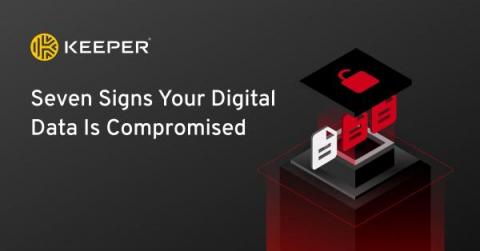Security | Threat Detection | Cyberattacks | DevSecOps | Compliance
Keeper
Seven Signs Your Digital Data Is Compromised
Personal data such as email addresses and passwords unlock our online identities and have become part and parcel of almost all accounts on the internet. Research indicates that there are over 5 billion daily web users worldwide and mobile phones account for about 60% of the world’s web traffic. Digital data examples include text messages, videos, satellite images and data from IoT, smart devices and social media.
The Benefits of Multi-Factor Authentication
Multi-factor authentication is important for online security. It helps protect your accounts from being compromised by unauthorized users by adding an extra layer of security. There are several benefits to implementing multi-factor authentication such as reducing password risks and meeting regulatory compliance. Read on to discover more about the benefits of using multi-factor authentication in your everyday life and business operations.
How to Prevent Password Attacks
Password attacks are one of the most common types of cyberattacks. They occur when someone tries to access your accounts by guessing or stealing your login credentials. You can prevent password attacks by enabling multi-factor authentication and using strong, unique passwords for your accounts. Read on to learn how you can keep yourself protected from these types of attacks.
2022 Cybersecurity Census Report Unveils Investment Urgency for UK's Education Sector
How Did Someone Guess My Password?
Finding out that someone has guessed your password can be a scary feeling. Passwords protect your important data, so having someone guess it is a major threat to your security. There are several ways someone could have guessed your password including having bad password habits and easy-to-guess security questions. Read on to learn more about password guessing and the steps you can take to avoid it from happening to your accounts.
Into the future: what might cybersecurity look like in 2023?
Why Small Businesses Need a Password Manager
Small business owners often have to wear many hats to keep their businesses up and running. As these businesses move forward and grow in size, not only do the responsibilities build up, but so does the risk of cybercrime. For small businesses, a password manager is essential as it guarantees secure password sharing, simplifies onboarding and offboarding employees and more.
What Is an Incident Response Plan?
An incident response plan assigns responsibilities and lists procedures to follow if an event such as a breach were to occur. Having a plan put in place to handle cybersecurity incidents at your business can aid your business in identifying when a cyberattack is taking place, how to clean up the mess that an attack leaves and prevent an attack from happening again. Read on to learn why an incident response plan is needed, incidents that require response plans and more.
The Future of Passkeys with Keeper Security
Did you forget your password…again? Wouldn’t it be great if you never had to deal with passwords ever again? Well, we’ve got great news for you! Meet the passkey, a brand-new passwordless technology built on industry standards by the World Wide Web Consortium (W3C) and the FIDO Alliance and backed by Apple, Google and Microsoft. Read on to find out what you need to know about passkeys – and all about how Keeper is planning to support them in 2023.











